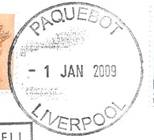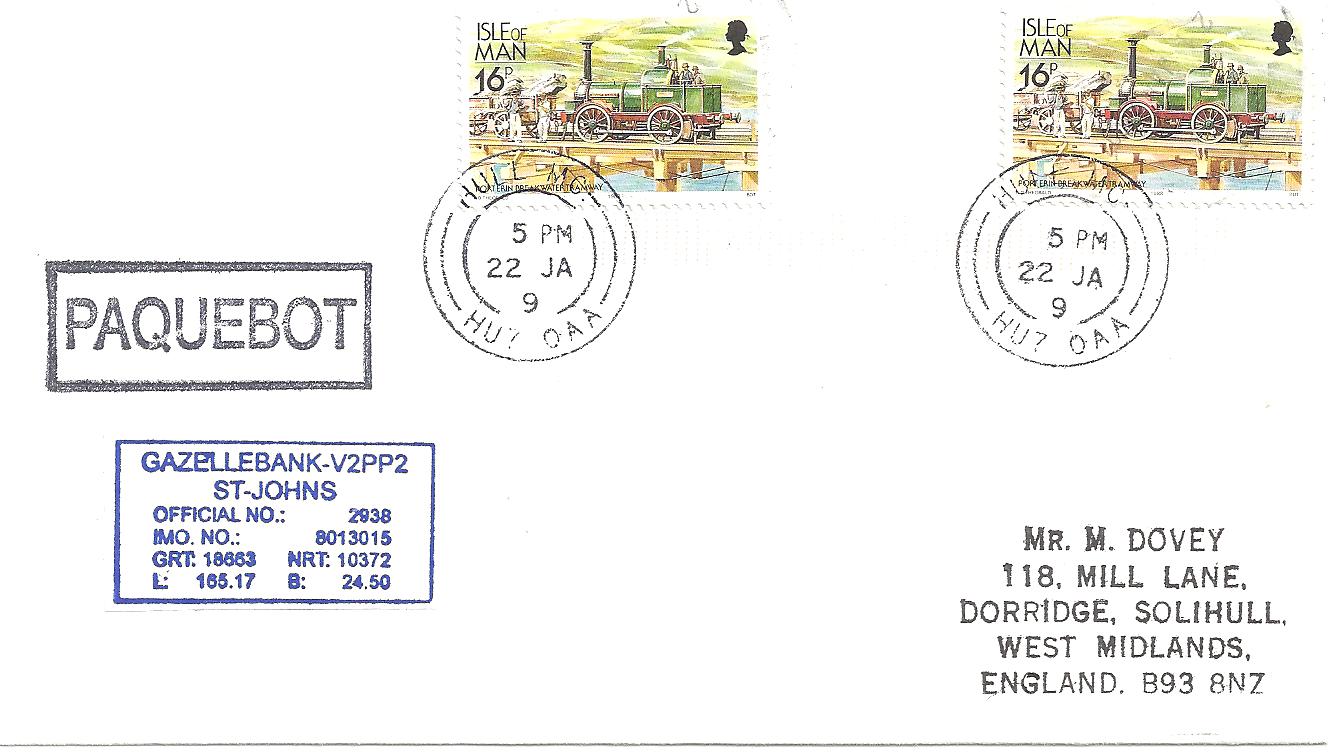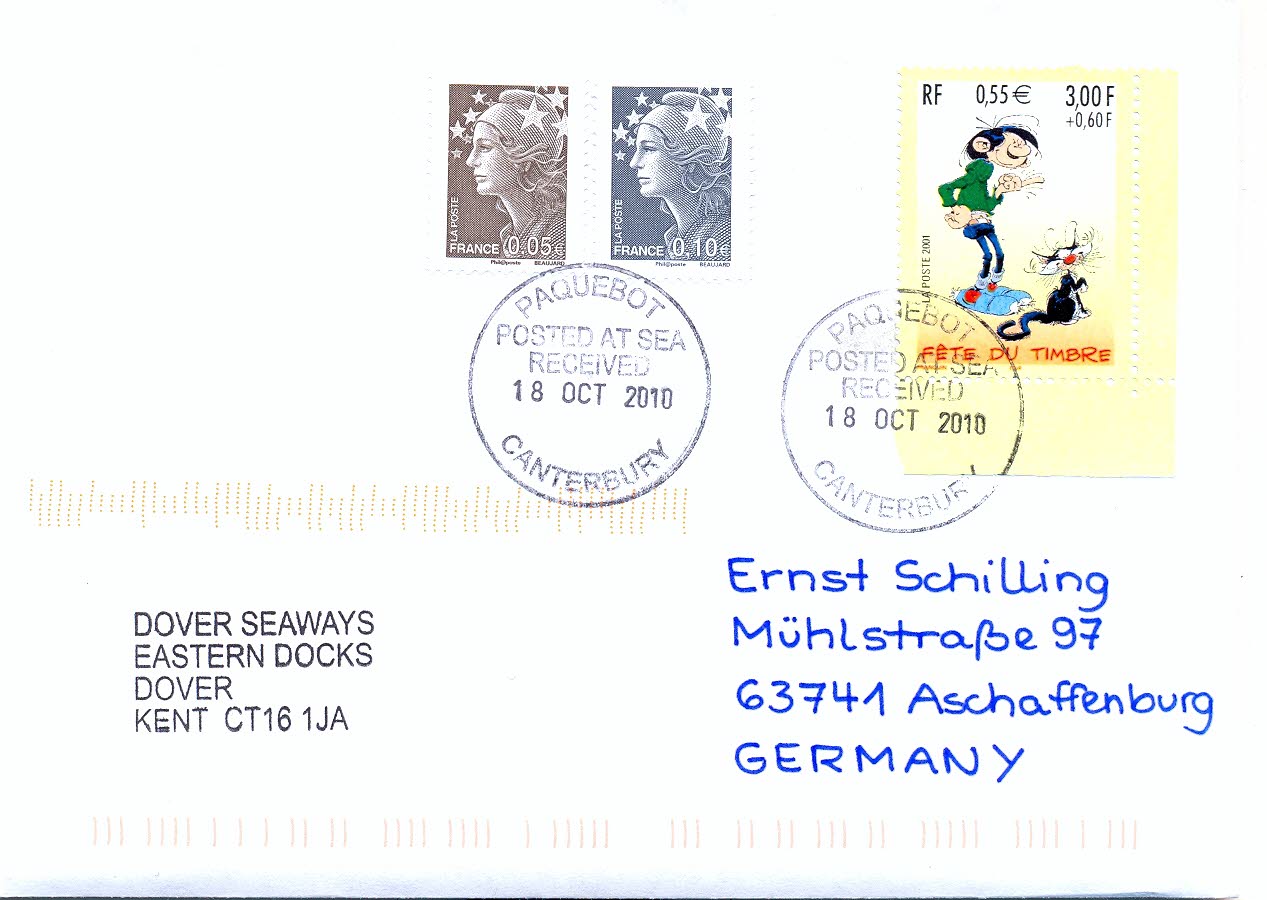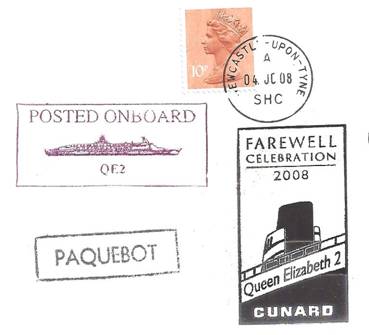Seapost -> Great Britain Paquebot Marks -> GB Paquebot cancellation service withdrawn
Great Britain Paquebot cancellation service withdrawn
By Julian Jones from correspondence by Mike Dovey, Keith Downing, Ian Billings, John Newcomb and many others.
The last word on GB Paquebot marks!
Background
The 15 October 2010 Postmark Bulletin from Royal Mail included the following brief announcement:
PAQUEBOT CANCELLATION SERVICE
Please note that from the 29 October 2010 the Paquebot Cancellation Service
will be withdrawn. We will no longer provide this service.
 Many interested collectors have written to Royal Mail on this topic.
Some have been good enough to also keep committee members posted of their replies.
Initially we received responses from Royal Mail that indicated managers at the top of the organisation do not
fully understand the significance of what they have done.
Many interested collectors have written to Royal Mail on this topic.
Some have been good enough to also keep committee members posted of their replies.
Initially we received responses from Royal Mail that indicated managers at the top of the organisation do not
fully understand the significance of what they have done.
The responses indicate some lack of knowledge about what is actually going on at ports in GB where mail bearing foreign stamps is brought in from ships for posting.
We and others wrote to Royal Mail to help them understand what is required of them by the UPU and what is actually happening on the ground.
Posted below are some then current examples of the operation of the Paquebot service at some GB ports. Thank you to those members / collectors who sent us scans.



 Click here
for a discussion of this topic on the Stampboards forum.
Click here
for a discussion of this topic on the Stampboards forum.
Status as of 23rd February 2011
The Society has not received a satisfactory reply to previous letters and has written again for clarification. Other societies have also written without getting a satisfactory response and are writing again to Royal Mail. It has been confirmed that the UPU have not withdrawn the Paquebot regulation.
April 2011
An Officer of the society has now received a reply from Royal Mail. Read it here.
October 2011
The situation in GB now appears to be as follows: It is obvious that ALL offices that deal with mail and sorting now use only machine franking and the lovely orange bar code writer. It appears that ALL hand stamps have been removed from service. Anything that is deemed to be "philatelic" will be forwarded onwards to one of only six centres where requests can be dealt with.
It is also apparent that Royal Mail have instructed Sorting Offices to send mail to centres which cannot help! For example, Southampton SO will send a request to Birmingham because they hold the paquebot mark which they cannot use. They do not have any other marks for Southampton as the special philatelic mark offered by Royal Mail is held at Mount Pleasant in London and this can only be used with a first class stamp. Likewise Liverpool, although Birmingham again holds the old paquebot marks, will send requests to South Shields who hold the new mark brought into use in October 2010 (which was phased out 3 weeks later). The philatelic mark offered is held in "Northern England" (ie South Shields) and it is not known whether a first class stamp must be used there.
The main problem in all this is that when a letter goes from, say, Southampton to Birmingham then Birmingham does not have any instruction to send the mail on to London (Mount Pleasant) and so they will forward the mail to the recipient! It is the recipient who has to find out about London and forward his own mail onwards and at his own expense.
Sounds chaotic, doesn't it?
December 2012
The following article by John Newcomb appeared in the TPO Journal Volume 66 No. 4 and seems to provide the final word on GB Paquebots.
UK Paquebots - Sunk Without a Trace!
In the days before travel by air had become the norm and when international journeys were often relatively leisurely ones by sea, a great many letters and postcards were written on board ships by passengers and crew. The accepted practice enshrined in the regulations of the Universal Postal Union was for such mail to be taken on by a responsible ship's officer who either cancelled the stamps or alternatively left this to be done after handover to the post office at the port of call. In that case postmarking was done with the office's date-stamp plus the additional word PAQUEBOT, NAVIRE or other similar. In 1892 the UPU established the convention that it was proper for such mail posted on the high seas (as opposed to territorial waters) to be prepaid by means of stamps of the country to which the ship belonged. In many countries this remains the practice to this day, and paquebot postings bearing British stamps can still be handed over at many foreign ports, but the reciprocal to this is no longer true of mail landed in the UK.
Our story begins with the short announcement in the Royal Mail's Postmark Bulletin that from 29 October 2010 the (philatelic) paquebot cancellation service was to be withdrawn. This came as a great surprise to many interested collectors who were totally unaware that such a facility at Special Handstamp Centres even existed. It also raised the question of what was happening with the "real" operational paquebot facility; Royal Mail soon confirmed that this had been withdrawn "some time ago": another surprise! Clearly it had eventually been realised that the reduced philatelic service made no sense in the absence of a genuine operational one underpinning it. Personally I applaud this decision: paquebot marks applied philatelically at places far distant from ports of arrival are, in my opinion, little better than fakes.
For nearly two years we have been pressing for information on when and in what circumstances the operational paquebot facility was withdrawn. This and related questions were put to Royal Mail under the Freedom of Information Act which we had been forced to invoke. We found that this has disadvantages in that no opinions or recollections are forthcoming: answers can only relate to information which is RECORDED and which does not cost more than £450 (18 man hours) to unearth. In numerous exchanges Royal Mail have repeatedly stated that they have no information on the subject, finally saying that they can field no one able even to look at OUR account of the situation and say whether they object to anything that we write! So we are reduced to leave posterity with our imperfect version of the story, full of gaps, and this now follows.
British paquebot postmarks have been seen between 2000 and 2010, but it is difficult to distinguish between marks which are truly operational and philatelic ones applied at Special Handstamp Centres, but we do have a few pointers.
A rumour reached the British Postmark Society that paquebot postmarking had ceased at Liverpool in 1995.
I personally posted a letter on a cross-channel ferry on 11 October 1998; this received a Canterbury paquebot postmark of 12.10.98 (Dover no longer being an Outward Vouching Office) and the item was transmitted so quickly that I do not believe it had time to be treated philatelically at an SHC.
Most paquebot items dated since then have a very "philatelic" look to them. I have not been able to establish precisely when the SHCs took on their new rôle.
Regrettably therefore we cannot pinpoint the timing of a formal cessation of the operational paquebot facility - if indeed this ever happened. We know of no relevant announcement, yet it is clear that what certainly did exist no longer exists now. Our guess - and it can be no more than that - is that the cessation was taking place between 1995 and 2000. Such scanty evidence as we have suggests that in practice not all port offices ceased to operate the paquebot facility at the same time.
The other big question is how Royal Mail justified its non-observance of a UPU regulation (which that body has assured me remains in force) and how we can ethically hand over our paquebot postings at foreign ports while refusing to accept theirs in the UK. Here we can only speculate. Regulation RL119 states: "… items posted on the high seas … may be prepaid, in the absence of special agreement by the designated operators, by means of postage stamps … of the country to which the ship appertains …" This wording does give some scope for manoeuvre: "… may be paid …" is slightly permissive, and it could be argued that there might - in theory - be special agreements between Royal Mail and its partner "designated operators". The wording could be construed to imply that if such agreements are made, the UPU does not have to be party to them. Possible loopholes? Maybe. Royal Mail say they do not believe there is an issue here under international law. I could imagine them saying: "What's the problem? Sure, we accept mail from foreign ships provided of course it conforms to our rules, i.e. that it's prepaid in British stamps. RL119 only says "may": - not that the objects MUST be prepaid in foreign stamps."
Other possibilities are that Royal Mail arbitrarily adopts the line "de minimis non curat lex" - they are not concerned with trifles - and so unilaterally ceased the service because it is now little used and operationally troublesome: this despite the requirement in the Postal Services Act that all changes to the services offered must be notified.
Perhaps the facility was simply, maybe inadvertently, swept aside or at least undermined by the closure of most provincial Offices of Exchange (OEs) in the early 1990's, leaving only Heathrow Worldwide Distribution Centre at Langley and Birmingham (for surface mail). There is evidence that in Headquarters level thinking OEs and Paquebot Offices (which are not the same thing) are linked in terms of their function. Be that as it may, the cessation of stamp cencelling at small port offices, whose normal collections were concentrated-on to distant Mechanised Letter Offices, and now to even further distant Mail Centres, would have made separate streaming of small volumes of paquebot mail for special handling operationally inconvenient.
And lastly, and I believe this to be the most likely scenario, maybe nothing at all was said or done to effect a formal cessation. A quiet little announcement was indeed made at the withdrawal of the philatelic "ghost" service (which I believe was only set up as a means of meeting those few protests from collectors, frustrated when their on board postings failed to secure a paquebot mark), but it seems quite possible that the operational facility had been stealthily left to wither and die. We have failed to find anyone who recalls a definite closure, still less produce written evidence of this. This could explain differing times of cessation at the paquebot offices.
To sum up, we can well understand why the facility was dropped. Royal Mail want their main operation to be as free as possible from frills and they are always motivated to get rid of a service of which use is diminishing and which inevitably gives rise to confusion and customer dissatisfaction because ever changing staff are unfamiliar with it and all too often mistreat the mail in question. Fewer and fewer passengers and crew have been writing letters and the procedure was becoming increasingly unpopular among ships' officers because of the fussy time-consuming documentation that it entailed: far simpler to hand the mail over to their agents ashore who can put it through the office franking machine. In these days ships' officials are not keen on accepting postings containing they know not what: P&O at Dover told me they had long since decided on security grounds to cease offering the service.
While it is clear what prompted Royal Mail to drop the paquebot service, from the collector's point of view this was not done in a very professional way. What a pity they failed to make a clean breast of it: most people would have accepted their reasoning. That is as far as we can take the story - unless of course there is anyone out there who can cast further light … Any information gratefully received by the writer via the [TPO Journal] editor.

